Momentum builds for June 28 vote as candidates outline programs, strategies
By Alireza Akbari
As momentum builds for Iran’s snap presidential election slated for June 28, candidates in the fray are engaged in hectic campaigning, leaving no stone unturned to impress the electorate.
On the second day of televised roundtables on Friday, more candidates presented their ambitious programs while facing probing questions from experts on the panels.
In other televised programs, presidential hopefuls continued to shed light on their strategies and blueprints concerning the key areas of economy, culture, and foreign policy.
Approved by the country’s 12-member election supervisory body, the Constitutional Council (formerly Guardian Council), the six aspirants are busy showcasing their meticulously crafted, pragmatic, and astute plans and vision for the Islamic Republic.
Their primary concern is to bolster the global stature of the Islamic Republic and enhance the quality of life for the Iranian populace under their potential leadership.
Harnessing global opportunities
In the first roundtable on Friday, at 14:30 local time, the former nuclear negotiator and head of the Supreme National Security Council, Saeed Jalili, accompanied by two advisors, participated in a 90-minute discussion focused on foreign policy issues.
Jalili underscored the significance of the election slogan, emphasizing its pivotal role as the cornerstone of the candidate’s four-year agenda.
He stressed the importance of leveraging “global opportunities” while mitigating threats through collaborative and diplomatic engagements with nations worldwide.
The veteran politician delved into the evolving political dynamics of the West Asia region post Operation Al Aqsa Storm last October, highlighting the emerging opportunities for the Islamic Republic in the wake of regional transformations.
Pres. candidate: Foreign policy opportunities facing Iran 'outnumber' threatshttps://t.co/bXfAxtoiYP
— Iran Election 2024 (@PressTVElection) June 14, 2024
Emphasizing the imperative for foreign policy initiatives to benefit the Iranian people directly, Jalili underscored the need to “harness global opportunities” to bolster the nation's welfare.
Furthermore, Jalili accentuated the necessity of a “pragmatic approach” in foreign relations, highlighting the potential for economic growth through improved ties with neighboring countries.
He extolled the late President Ebrahim Raeisi for his impactful contribution to Iran's economic and international standing, particularly commending the strategic endeavors that facilitated currency generation and job creation within the country.
By championing “innovation and a nuanced understanding of geopolitical contexts,” Jalili emphasized the role of “keen foresight” in capitalizing on emerging opportunities.
Societal well-being and advancement
Mostafa Pourmohammadi was next to appear on state TV in an hour-long program at 17:30 local time, presenting his vision as a potential leader of the Islamic Republic.
The former minister of interior affairs (2005-2008) and justice minister (2013-2017) exuded confidence as he conveyed his belief in his preparedness to assume the top executive role.
Emphasizing his campaign theme centered around fostering societal “well-being,” Pourmohammadi stressed the multifaceted advancement of society in areas encompassing “culture, economy, and scientific development.”
Central to his agenda, he declared a steadfast commitment to "justice" as the fundamental bedrock shaping his potential future government, highlighting its pivotal role in “harmonizing societal power dynamics and wealth distribution.”
Addressing economic vitality and power dynamics, the presidential contender advocated for an increase in the gross domestic product (GDP) while underscoring the significance of leveraging both “soft and hard power” as vital defenses of the Iranian nation's “rights.”
"The Issue of Palestine is the symbol of Islamic Republic's diplomacy"
— Iran Election 2024 (@PressTVElection) June 14, 2024
Presidential candidate @mopourmohammadi says the issue of Palestine is about the domination of the West over the interests of the region. pic.twitter.com/ctEuFKlCBz
Aligning with his focus on governance, he spotlighted the essential need for a streamlined and efficient bureaucratic system to form an integral part of his strategic direction.
“Transparency and the battle against corruption” formed core pillars of his discourse, with a pledge to adopt measures such as “electronic government systems” to reinforce accountability and diminish corrupt practices.
Deepening his commitment to openness, Pourmohammadi affirmed a commitment to providing regular "reports" to keep the Iranian public informed about governmental activities.
Asserting the significance of a “robust” diplomatic front, the candidate voiced readiness to pursue a “powerful diplomacy,” leveraging the combined advantages of soft and hard power to advance the collective objectives of the Islamic Republic on the global stage.
Future shaped by a shared vision
Masoud Pezeshkian, another presidential candidate and former health minister, took over at 18:30 local time, with a half-hour presentation, unveiling a narrative steeped in his personal insights and national service that underscored his commitment to the Islamic Republic.
A seasoned parliamentarian, Pezeshkian started with details about his origins, educational pursuits, and formative experiences, including his dedicated service during the Sacred Defense era, imbuing his discourse with a sincere tone.
He articulated a vision of empowerment, heralding the “potential embedded within every individual across the nation” as a catalyst for national advancement.
Envisioning a future shaped by collaboration, empathy, and a shared vision, he invoked the virtues of unity and mutual trust as cornerstones for effecting meaningful change.
Emphasizing the pivotal role of youth in shaping the country's future, Pezeshkian underscored the imperative of “forthrightness” in guiding and supporting their aspirations.
Presidential candidate @drpezeshkian emphasizes the importance of using experts to implement necessary reforms in order to improve Iranian economy. #IranVotes2024 pic.twitter.com/pzH5QjEZkX
— Iran Election 2024 (@PressTVElection) June 14, 2024
In outlining his governmental approach, Pezeshkian advocated for a foreign policy rooted in “diplomacy and dialogue,” eschewing engagement on the global stage.
Emphasizing the power of conversation as a bridge to foster understanding and cooperation, he prescribed a narrative of dialogue in interactions both regionally and internationally.
Furthermore, Pezeshkian affirmed the inherent right of every person to flourish based on their “talents and capabilities.”
Family as the bedrock of society
Amir-Hossein Ghazizadeh Hashemi, a former lawmaker and head of an organization dedicated to the welfare of martyrs and veterans' families, took center stage as another in a live televised roundtable, commencing at 7:00 PM local time, flanked by two cultural advisors.
In a 90-minute televised program, Ghazizadeh Hashemi unveiled his cultural blueprint for the country, placing "family" at the nucleus of his strategic vision.
With unwavering conviction, he stated that family “stands as the bedrock of society," a testament to his profound understanding of the cultural fabric woven into the nation's ethos.
Propelling his candidacy under the banner of a "government of people and family," Ghazizadeh Hashemi highlighted a civilizational perspective on cultural issues, juxtaposing the individualistic ethos of Western cultures against the collective ethos rooted in family within Iranian and Islamist traditions.
"We must work on values pursued by martyred President Ebrahim Raeisi"
— Iran Election 2024 (@PressTVElection) June 12, 2024
Speaking to Press TV, presidential candidate @GhazizadehSA said his administration, if he wins the election, will stay "on the right course".#IranVotes2024 pic.twitter.com/mxZpbnU19Y
Delving deeper into societal dynamics, the candidate shed light on the pivotal role of women, acknowledging their multifaceted contributions even within the confines of traditional Iranian society.
Recognizing women as half of the societal tapestry, he advocated for tailored social and administrative frameworks to empower and accommodate women’s needs and aspirations.
Ghazizadeh Hashemi also underscored the significance of engaging individuals from all strata of society in addressing prevalent challenges.
Hailing the cultural legacy of late President Ebrahim Raeisi, the presidential candidate aligned his vision with the administration's plans, asserting their alignment with the directives of Ayatollah Seyeyd Ali Khamenei, Leader of the Islamic Revolution.
Intellectual and human capital as assets
After that, the spotlight shifted to Tehran Mayor Alireza Zakani, who appeared on the IRIB at 22:00 local time, unveiling his economic strategies and blueprint for realizing the objectives outlined in the Seventh National Development Plan.
In a 45-minute program that kicked off with a probing question regarding his familiarity with the national plan, the seasoned parliamentarian, boasting four terms of representation in the parliament, revealed his intimate acquaintance with 3 out of the 7 National Development Plans, and citing his pivotal role in steering the course of the 6th National Development plan.
Pointing to the significance of the current 5-year roadmap, he emphasized its intrinsic value to the nation's progress, advocating for unwavering adherence to its directives.
Zakani positioned his administration as a beacon of “service,” dedicated to addressing the populace's woes and leading a holistic transformation in the country's “infrastructural” landscape.
Presidential candidates @arzakani4 and @mopourmohammadi touch on Iran's economic problems and how they should be addressed. #IranVotes2024 pic.twitter.com/A8QSmClMDJ
— Iran Election 2024 (@PressTVElection) June 14, 2024
Drawing parallels between past achievements and future ambitions, he lauded the Tehran municipality's exemplary “70% implementation rate of the Fourth National Development Plan” as a testament to his adeptness in navigating the complexities of the current national strategy.
Praising the nation's intellectual and human capital as its most prized assets, the candidate outlined a vision of “inclusive mobilization and participatory planning” as key to driving the plan's success.
By leveraging the collective prowess of the populace and instating robust sustenance packages encompassing housing, healthcare, enhanced purchasing power and energy provisions, he envisioned a substantial mitigation of societal inequities and empowerment of individuals at large.
Fostering economic growth
At around 22:45 local time, a 90-minute live roundtable discussion unfolded in the presence of a seasoned politician and the speaker of the Iranian parliament, Mohammad Baqer Qalibaf.
He faced a barrage of inquiries from the panel of experts but deftly navigated the interrogation with succinct, precise responses that left no room for ambiguity.
Drawing from the inputs provided by his advisors, Qalibaf adeptly wielded his knowledge and experience to address each query comprehensively, instilling confidence in his ability to deliver on his proposed plans by citing his sterling track record as a “testament to his commitment to action.”
When challenged on the feasibility of his proposed initiatives, the seasoned statesman invoked his past achievements as a “guarantor” of his future success, emphasizing the imperative of “curbing inflation and fostering economic growth” as pivotal parts of his governance agenda.
Poll of Polls: How do candidates fare ahead of June 28 presidential vote#IranVotes2024 pic.twitter.com/mo6htddaLq
— Iran Election 2024 (@PressTVElection) June 14, 2024
He underscored the indispensable role of the chief executive of the country in actualizing legal frameworks, likening the law to a document that requires stewardship for its efficacy, positioning himself as the capable executor poised to transform policy into palpable progress.
Delving into the economic realm, Qalibaf underscored his dedication to realizing the objectives outlined in the Seventh National Development Plan, lauding it as a robust blueprint for national advancement.
Emphasizing a hands-off approach to the Central Bank of the Islamic Republic of Iran (CBI), he stated his vision for minimal governmental intervention in the bank.
Furthermore, the contender highlighted the burgeoning opportunities presented by the BRICS and the Shanghai Cooperation Organization, characterizing these economic blocs as veritable bastions of potential for fostering collaboration and driving growth on a regional and international scale.
Iran Armed Forces confront all violations against the country’s soil: Ground Forces cmdr.
IRGC deploying ‘new weaponry’ during underway Ground Force drills
VIDEO | Press TV's news headlines
Another key hospital taken out of service by Israel in north Gaza
Iran's top medical association urges ‘safe’ release of Gaza hospital’s director
Hezbollah chief: Gen. Soleimani was a leader on strategic, intellectual levels
Euro-Med warns Dr. Abu Safiya’s life in great danger due to torture
MP: Israel violating ceasefire agreement with Hezbollah to make up for defeats


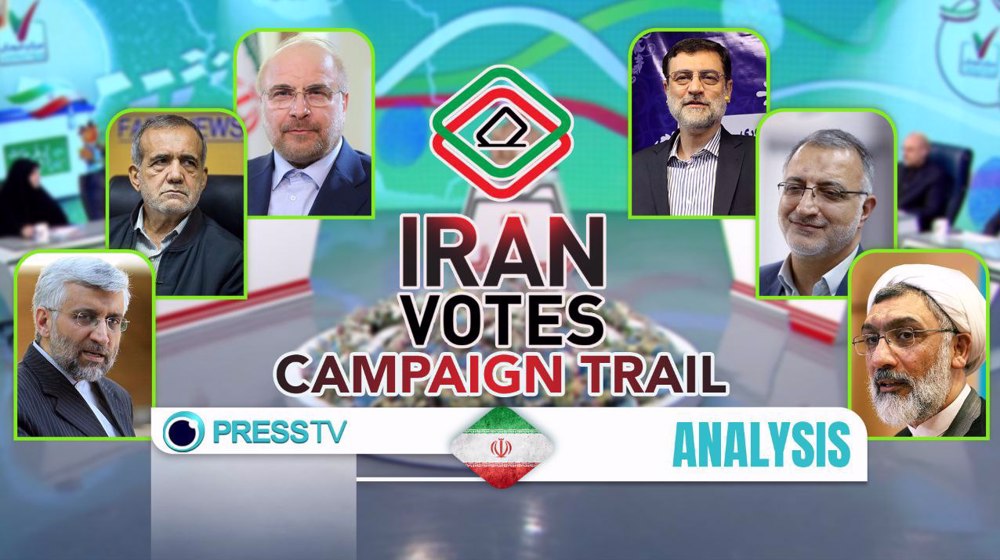
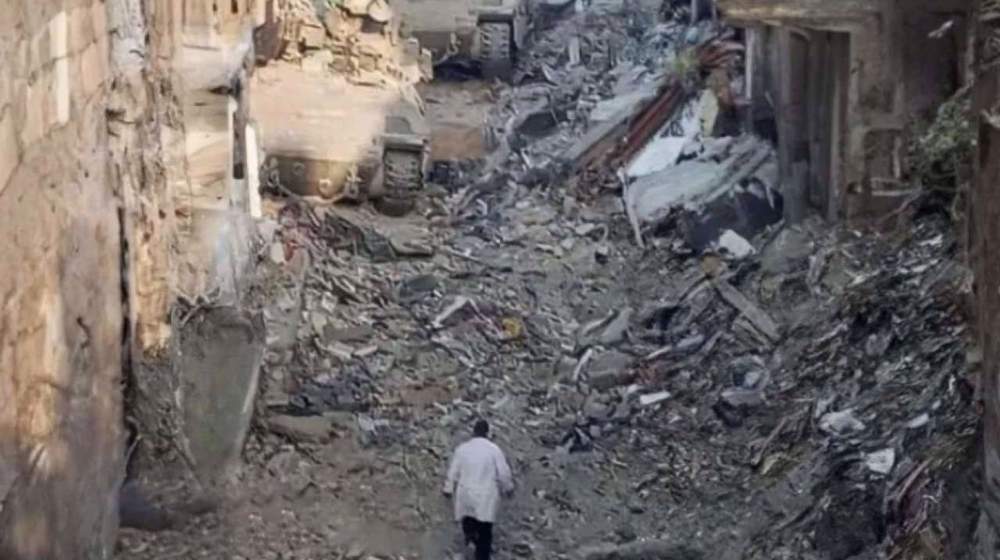
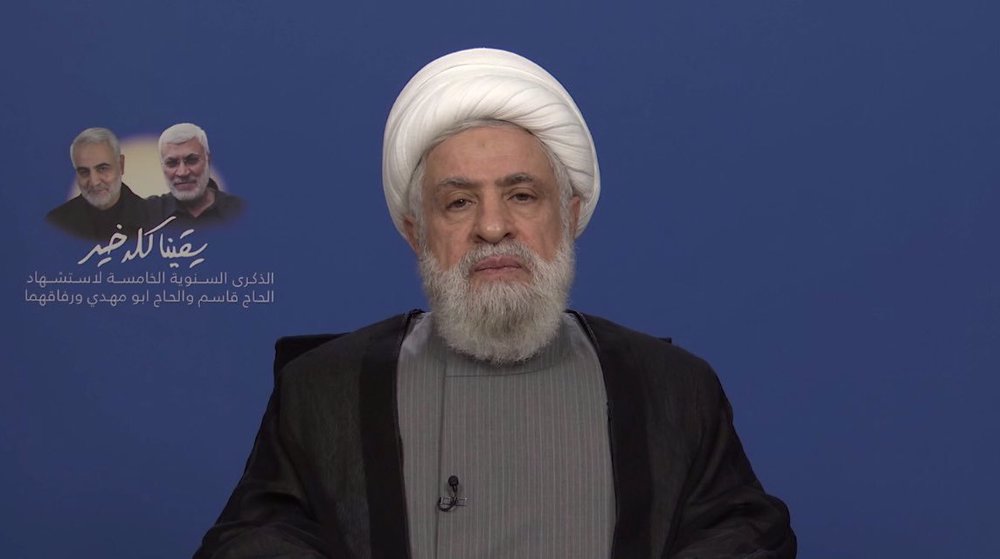
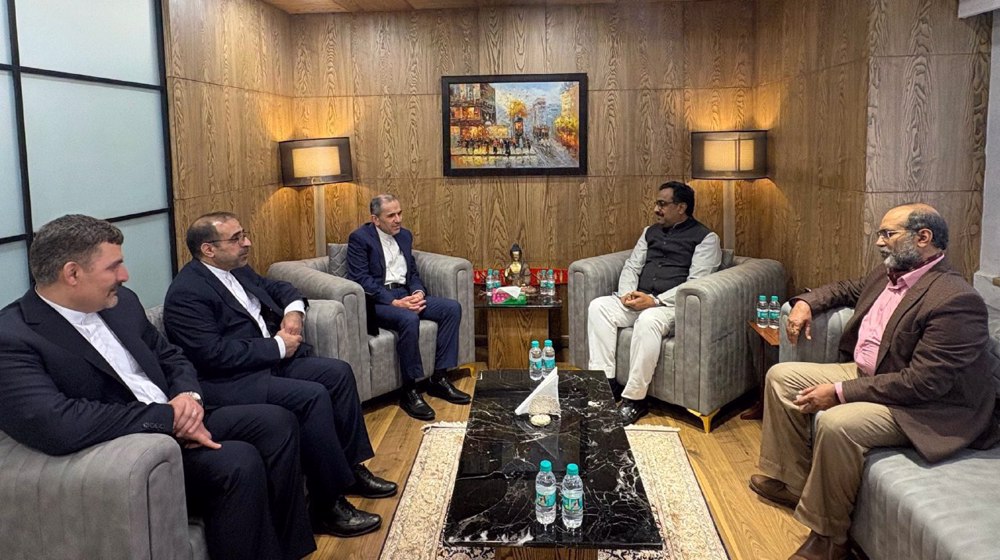



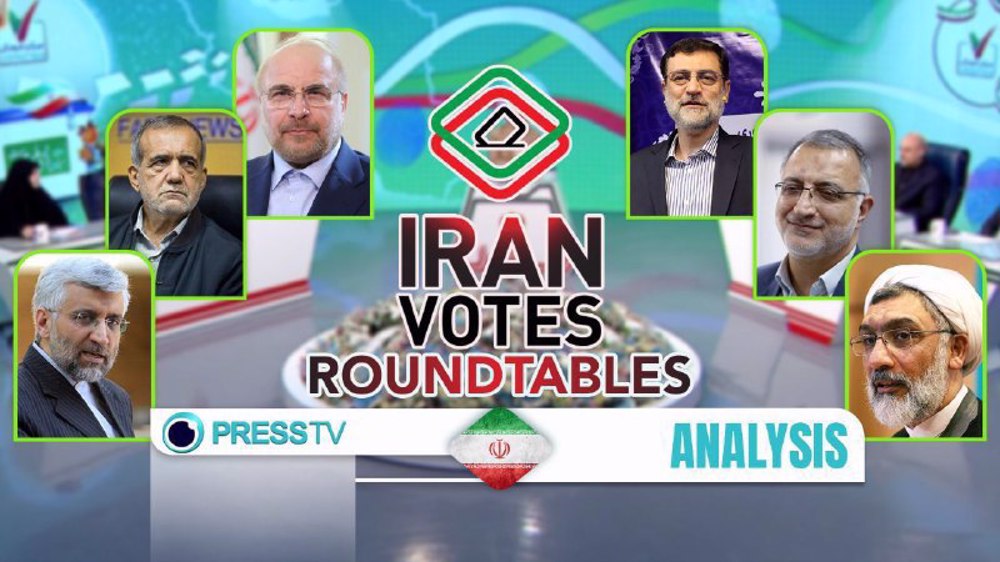





 This makes it easy to access the Press TV website
This makes it easy to access the Press TV website